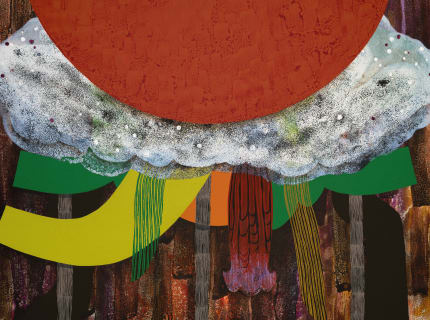Viewers who already know Carrie Moyer’s body of work will find the exhibition “Carrie Moyer: Pirate Jenny” comforting in its familiarity—it is host to Moyer’s characteristic fluid forms, bold colors, and collagelike compositions. Since the 1990s, the New York-based artist has produced work that addresses the LGBTQ presence in society. This go-round, she presents a collection of recent paintings and prints that reference humanity as a whole rather than any one sector of it.
Moyer’s abstracted images are amorphous yet anthropomorphic—although they are nonrepresentational, at times they create shapes that resemble biological forms. Eyes, torsos, eyelashes, saliva, and fingers materialize in the organic shapes in her works. Forms overlap, intersect, and penetrate each other in the paintings, creating dynamic designs that look like microscopic views of organisms or portions of complex ecosystems. On view at the SCAD Museum of Art through October 2, “Pirate Jenny” is entrancing. Through the works’ allusions to natural and bodily forms and the artist’s fluid handling of the medium, the exhibition captures the motion and vitality of living, the balance of nature, and the imperfection of human nature.
“Pirate Jenny”’s namesake is the oft-covered song of the same title from The Threepenny Opera. In the song, a slighted maid is scrubbing floors and making beds when pirates infiltrate her town. She then orders the townspeople dead and escapes on a pirate ship—“the black freighter.” The maid’s revenge fantasy predicts a revolution, a change in tradition. But Moyer’s black freighter isn’t impending revolution—it’s an evolution of the way human nature is perceived. Like biological processes, Moyer’s paintings are at once meticulous and spontaneous. Shapes appear to have grown, dripped, and accumulated on the canvases. With each layer of paint, graphite, and glitter, Moyer creates a living, breathing environment in which every shape and color fulfills its distinct role. She allows every element to take shape and evolve on its own.
In one of Moyer’s untitled monotypes, a dark shape stains an orange background like an ink spill. The shape resembles a female body, with a waist and breasts and sloping shoulders—but it doesn’t seem deliberate. I felt like the female figure was my interpretation, my desire to form a connection with reality. The shape is opaque in some areas and transparent in others. It has appendages that don’t usually appear in the human form. I stared at the print for minutes, trying to discern the true image, expecting it to switch like the rabbit-duck illusion. Moyer doesn’t seek to overhaul existing notions of identity, gender, and sexuality in one fell swoop, but to compel society to question and evaluate its perceptions of identity, gender, and sexuality. Unlike the vengeful lesbians in Dyke Action Machine!’s (Moyer and Sue Schaffner’s public art project) 1994 agitprop poster Straight to Hell: The Film and Pirate Jenny herself, Moyer’s method of redressing ingrained ideals is reasoning over retribution.
The paintings and prints in “Pirate Jenny” complement each other to form a narrative of obscurity, hidden layers, dissected human forms, and indefinable images, their abstractions made political through context and knowledge of Moyer’s repertoire. The artist’s intent is not to proselytize but to present works that dare viewers to reconsider how they perceive reality and truth through ambiguous images with social overtones. Her references to Abstract Expressionism and Surrealism reflect an emphasis on the subconscious over the conscious, the mind over the body, and the essence of life over its physical form. Moyer’s undulating, curvilinear, and organic shapes combine to form works of art that are spectacles of color, craftsmanship, and artistry. Like her painting of the same name, Moyer says “damn everything but the circus” and fills her artwork with the carefully orchestrated chaos that characterizes life.
...
Read review at burnaway.org

